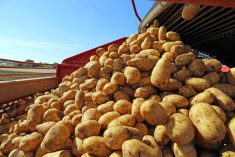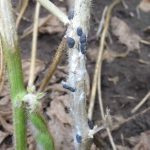The new National Potato Wart Response Plan is complete and will take effect for the 2025 potato crop.
Potato wart is soil-borne fungus that can reduce potato yield and quality. In 2021 and 2022, exports of potatoes were restricted from Prince Edward Island after the disease was found in some fields.
The response plan outlines protocols for when potato wart is detected in Canada (except for Newfoundland and Labrador).
New measures in the plan include requirements for users of restricted fields to implement preventative control plans and additional soil sampling and analysis requirements for restricted fields, the Canadian Food Inspection Agency (CFIA) said in a Thursday news release.
Read Also

Wheat breeding system no longer works, Canadian Wheat Research Coalition report says
A Canadian Wheat Research Coalition report, published Feb. 26, says the status quo is not an option for Canada’s wheat breeding system. It must be transformed, by farmers.
Seed potato certification will no longer be available for seed potatoes grown in restricted fields, as these pose significant risks for spreading the disease.
The CFIA developed the plan in consultation with groups like the Canadian Potato Council, the Prince Edward Island Potato Board, and the P.E.I. provincial government.
The CFIA said it met with growers in P.E.I. to discuss the new plan and the transition for users of currently restricted fields, which will continue to be restricted under the new plan.
The National Potato Wart Response Plan replaces the Potato Wart Domestic Long-term Management Plan, enacted in 2009.
The 2024 National Potato Wart Survey turned up no cases of the disease in Canada. The survey analyzed soil samples from fields across the country that had no previous associations with known potato wart cases.
















